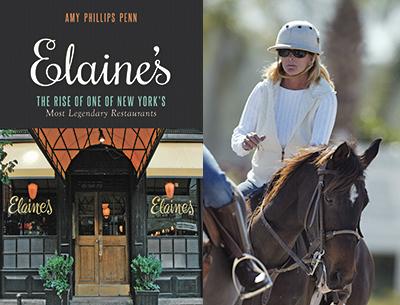Miss Kitty for the Lit Set

“Elaine’s”
Amy Phillips Penn
Skyhorse, $19.99
Publishing is changing, we keep hearing. That gnashing of teeth? Our own molars as we try to suss out what’s true, what’s possible. What is the future? E-books seemed to be overtaking traditional pulp and ink. Yet a rebalancing act has begun. E-books seemed to capture a significant percentage of the biz. And then there was a turnaround. At the beginning of last year e-books represented 23 percent of all books purchased, soft and hardcovers 67 percent. All is not lost.
Which brings us to another aspect of literary realities and futures. In 1963 Elaine Edna Kaufman bought an Austro-Hungarian bar on Second Avenue in Manhattan, unfashionably uptown. As Amy Phillips Penn recounts in her book “Elaine’s,” Elaine had partnered with Donald Ward, and there was a “metaphorical coin toss” figuring out whose name would go over the front door. Ward is said to have wanted to keep Truman Capote out of the restaurant because he was gay. “Elaine would have none of that,” Ms. Penn writes. And so the quintessential writers watering hole was born.
Only it wasn’t a place for writers and editors exclusively. Actors, police commissioners, gangsters, and the clergy regularly flocked to the watering hole. Elaine’s figured prominently in songs and movies. In “Big Shot” Billy Joel wrote: “They were all impressed with your Halston dress and the people that you knew at Elaine’s.” The novelist Stuart Woods featured Elaine’s in the opening scene of every one of his Stone Barrington novels. Elaine’s had important roles in Woody Allen’s films “Manhattan” and “Celebrity.”
Elaine herself was a force majeure. In more ways than one. As Ms. Penn quotes one tabloid photographer: “Elaine was loud, pushy, boisterous, tough-as-nails, took shit from NO ONE, including us photographers. She almost always kept us out on the street cooling our heels whilst the likes of Woody Allen, Robert De Niro, and every other famous actor and author kept coming back for dinner night after night.”
Some of the other regulars, many of whom were East End regulars as well: Kurt Vonnegut, Mario Puzo, Joseph Heller, Bruce Jay Friedman, Jacqueline Kennedy Onassis, Alec Baldwin, William Styron, Gay Talese, Taki, Esther Margolis, Tony Hendra, Candace Bushnell, Clay Felker, Anthony Haden-Guest, Roman Polanski, Liz Smith, Chris Noth, Peter Dinkle, and Ron Galella (outside, of course). Someone once asked Elaine where the restroom was: “Take a right at Michael Caine.” Once when habitué Norman Mailer and Elaine had a “doozy of a drag out,” Ms. Penn recounts, he wrote her a long screed vowing never to return. Elaine wrote “BORING” on his pages and stuck them in the mail. He was sitting at his regular table, knife and fork in hand, a few nights later.
Some other events that made it onto Page Six: The writer and editor George Plimpton had a wedding reception in that saloon. The screenwriter and author David Black’s marriage to Barbara Weisberg was there. The New York Post columnist Steve Dunleavy punched the music producer Phil Spector in the nose.
But there were plenty of stories that didn’t make it into newsfeeds. Elaine was constantly acting as agent for writers and photographers, getting them work when they didn’t have much. She quietly “lost” dinner checks for struggling writers, paid medical bills, sent clothing to their children.
One of the most affecting stories, recounted by F.B.I. Special Agent MarkRossini in Ms. Penn’s book, centers around his mother’s illness. She’d had a stroke and was doing very poorly. Over dinner Elaine asked after his mother. After he said that she was wheelchair bound, brain damaged, and about to be sent to a nursing home, another regular, Dr. Richie Saitta, immediately phoned Dr. Michael Kaplitt, a Weill Cornell neurologist. Rossini’s mother had been misdiagnosed after an emergency procedure. After the follow-up surgery, Rossini’s mother was up and about, walking nine miles a day. Rossini cites one of his bosses, John Miller, the N.Y.P.D.’s deputy police commissioner for intelligence: “There wasn’t anything that couldn’t be solved or fixed at Elaine’s.”
So many more stories about Elaine and Elaine’s to be told. And a discovery that needs to be made: Dodge City had its Miss Kitty. Casablanca had its Rick. Manhattan desperately needs an Elaine successor. A rainmaker. An Auntie Mame. A party who is interested and disinterested. Someone who understands the literary world, who will nurture writers, who gets the allure, the magic, thetrauma, the mystery. Someone who loves the life of letters. And that whole complex whamajangle of New York.
Laura Wells is a regular book reviewer for The Star. She lives in Sag Harbor.
Amy Phillips Penn, a former New York Post society columnist, was a summertime resident of East Hampton for many years. Elaine’s closed in 2011, not long after Elaine Kaufman’s death in December of 2010 at the age of 81.
